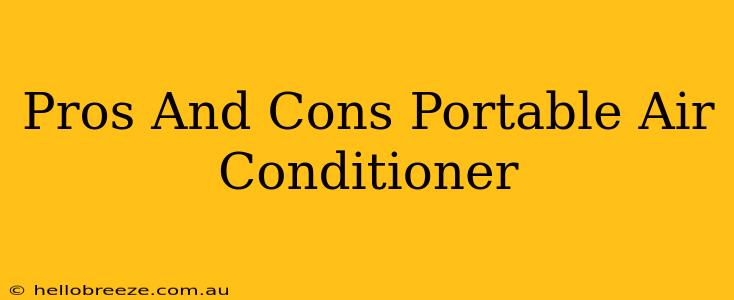Summer heat got you sweating? A portable air conditioner might seem like the perfect solution, offering cool relief without the hassle (and cost!) of installing a central unit. But before you rush out to buy one, it's crucial to weigh the pros and cons carefully. This comprehensive guide will help you decide if a portable AC is the right choice for you.
The Cool Advantages: Pros of Portable Air Conditioners
Portable air conditioners boast several compelling advantages that make them a popular choice for many homeowners and renters:
1. Easy Installation and Portability: The Ultimate Convenience
This is arguably the biggest draw. Unlike window or central AC units, portable ACs require no professional installation. Simply plug them in, add water (for some models), and you're ready to beat the heat. Their portability is also a huge plus. Move your cool comfort from room to room as needed – no more sweltering in one area while another stays frigid.
2. Cost-Effective Solution (Initially): Saving Money Upfront
The initial purchase price of a portable AC is generally lower than that of a window or central air conditioning system. This makes them an attractive option for those on a budget or those who only need cooling in one or two rooms.
3. No Alterations to Your Home: Renters Rejoice!
A significant benefit is the lack of permanent alterations to your home. This is especially great for renters who are unable to install window units or make changes to their existing HVAC system. Simply move it out when you move out!
4. Targeted Cooling: Cool Where You Need It
Want to cool just your bedroom or living room? A portable AC allows for precise temperature control in specific areas, rather than cooling the entire house which can be energy-intensive and unnecessary.
The Chilly Realities: Cons of Portable Air Conditioners
While portable air conditioners offer many benefits, it's essential to acknowledge their limitations:
1. Less Efficient Than Other Types: Energy Consumption
Portable air conditioners are generally less energy-efficient than window or central AC units. They often have a higher energy consumption rate due to their design and the method of exhaust heat. This can translate to higher electricity bills.
2. Noisy Operation: Sound Levels
Many portable AC units can be quite noisy, especially the less expensive models. The sound of the fan and compressor can be disruptive to sleep or quiet activities. Consider noise levels when choosing a model.
3. Exhaust Hose Requirement: A Necessary Evil
These units require an exhaust hose to vent hot air outside. This hose often needs to be extended through a window or door, potentially impacting the aesthetics of the room and presenting a small security risk if not properly secured. Improper venting will also reduce efficiency.
4. Limited Cooling Capacity: Small Spaces Are Best
Portable ACs typically have a lower cooling capacity than other types of air conditioners. They are best suited for smaller rooms or spaces; attempting to cool a large area might prove ineffective.
5. Potential for Water Collection: Maintenance Needed
Some portable AC units collect condensation, requiring regular emptying of the water reservoir. Failing to do so can lead to malfunctions or water damage. Regular maintenance is key.
Making the Right Choice: Portable Air Conditioner or Not?
Ultimately, the decision of whether or not to purchase a portable air conditioner depends on your individual needs and circumstances. Consider the size of the space you need to cool, your budget, your tolerance for noise, and the potential for higher energy bills. Weighing the pros and cons carefully will help you make an informed decision that keeps you cool and comfortable all summer long.

